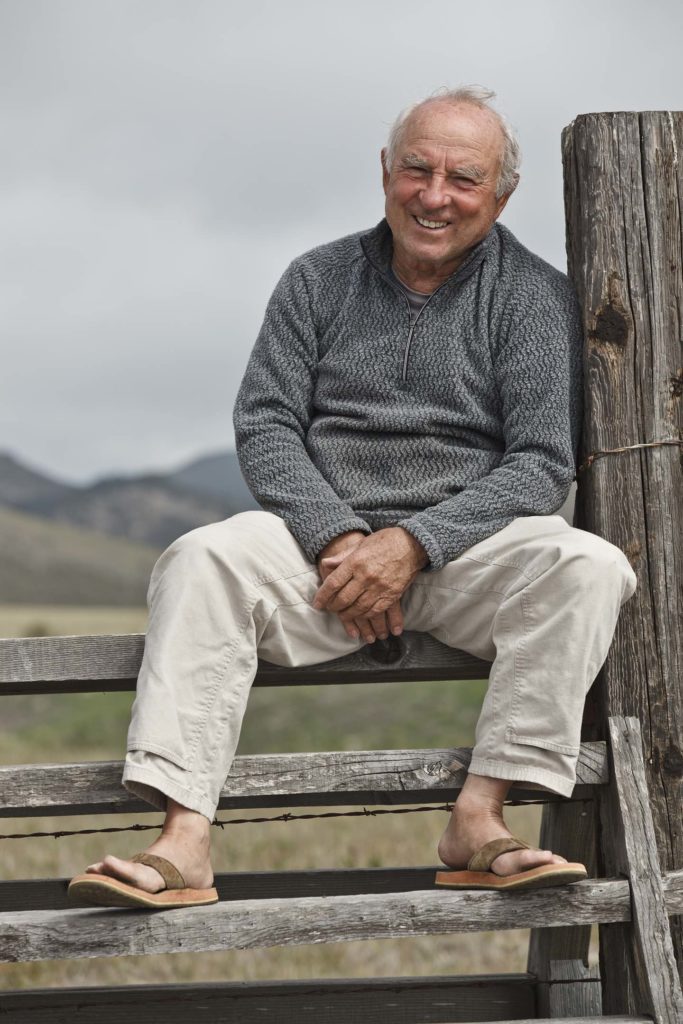Here at EBS, we celebrate all that the larger Outlaw Partners editorial department has accomplished–including 10 strong years of Mountain Outlaw magazine. Periodically, we like to share some of the best stories from that sister publication. Enjoy.
-EBS STAFF
By Emily Stifler Wolfe
With hands thick and weathered from decades of rock climbing and blacksmithing, Yvon Chouinard piles veggies onto a plate for lunch. Focused on the organic salad bar at Patagonia’s Ventura, California, headquarters, he selects spinach, kale, romaine, edamame, radishes, fennel, quinoa, cashews. By the end he’s got a bit of everything. Literally.
In flip-flops, a short-sleeved button-down and what he told me earlier are 20-year old pants (all Patagonia), Chouinard shuffles over to the hot bar where an employee serves us mashed sweet potatoes and black bean patties (“These are really good,” he says, grinning.), and then to the checkout counter. As founder and owner of the leading outdoor clothing and gear retailer Patagonia, Chouinard pays for his food in the company’s subsidized cafeteria, just like everyone else.
Seated at one of the long tables, we hunch together to hear each other as employees pass us on their way to eat outside. “What’s important is a varied diet,” he says, “as many different things as you can get.” He’s referring to the unique nutrients of each veggie on his own lunch plate, but also to eating foods like eggs from free-range chickens, which themselves consume a wide range of plants and insects.
Now 80, Chouinard is all of 5 feet 4 inches tall but remains a giant in the world of rock climbing and conservation. He established cutting-edge climbs in the U.S. and Canada during the sport’s 1960s and ‘70s golden age and got his start in business by forging steel climbing gear in the late 1950s, which he sold out of the back of his car to fund outdoor adventures. Patagonia is now a billion-dollar company that’s donated more than $100 million to grassroots environmental causes. It has long been an innovator in apparel, visual storytelling and activism. A diehard outdoorsman, Chouinard spends around half his time fly fishing and surfing, and half at work. But he’s not sitting at a desk trying to sell more clothes. He’s out to stop the climate crisis, and he wants to do it through agriculture.
“We’re losing the planet. We really are,” he told me earlier that morning in his office upstairs, his voice gravelly. “And I’m not going to let it go without fighting, so we have to try harder.”
Chouinard, who is sometimes compared to conservation greats John Muir and David Brower before him, has become increasingly vocal about the role of private business in protecting the environment and public land. Maybe you’ve read how the company’s philanthropic giving has benefited the bottom line, how it sued the Trump administration for rescinding a million acres of southern Utah’s Bears Ears National Monument, or how it backed Senatorial candidates including Montana Democrat Jon Tester, a conservationist and public lands advocate. Both Chouinard and Patagonia will likely become even louder as they try living up to the company’s new mission: “We’re in business to save our home planet.”
For Patagonia, that means going carbon neutral and non-extractive by 2025, getting deeper into politics, and boosting support for conservation work — Chouinard estimates within five years they’ll be giving $50 million annually to grassroots environmental groups. And in 2012, he started Patagonia Provisions, a separate division of the company that sells sustainably produced and harvested foods like organic grains and responsibly caught salmon. Its goal is to create a market for climate-friendly foods.
If this seems a far cry from outdoor clothing, think again. Patagonia has woven its interest in agriculture into textiles since switching to organic cotton in the 1990s after new T-shirt shipments made staff sick at a Boston retail store. Treated with formaldehyde like many garments, the shirts woke Chouinard to the toxic nature of conventionally grown cotton. But, with little industry demand, Patagonia had to create its own supply chain, something it’s since done with hemp, wool, Yulex (a wetsuit fabric made from tree rubber instead of the petroleum-based neoprene), and now food.
“Agriculture as it relates to food is one of the biggest contributors to climate change,” said Birgit Cameron, managing director for Patagonia Provisions. Indeed, agriculture and associated land-use account for a third of global greenhouse gas emissions and 70 percent of water consumption, according to research conducted by the World Bank. But, Cameron says, through regenerative organic agriculture, food may also offer solutions.

Photo by Jeff Johnson / Courtesy of Patagonia
This style of land management uses a combination of older farming techniques including crop rotation, reduced tillage, cover crops and livestock integration. The practice can increase yields, reduce costs, improve water and soil quality, and sequester carbon. The idea is to have the water, nutrient and energy cycles mimic those occurring in nature, says Dwayne Beck, research manager at the Dakota Lakes Research Farm in Pierre, South Dakota, and a leader in the field.
“If you don’t do that, then the ecosystem collapses. You’re mining,” said Beck, also a Ph.D. professor in South Dakota State University’s Agronomy, Horticulture and Plant Science Department.
The field is growing quickly and studies show it could help solve some of the world’s most pressing problems, among them hunger and climate change. Project Drawdown, a science-based proposal to roll back greenhouse gas emissions within 30 years, rates regenerative agriculture as number 11 in the top 100 existing solutions. Beck cautions we need more peer-reviewed science to define which techniques are truly regenerative. Organic production, for example, can be unhealthy for the environment and humans because it’s difficult to accomplish without tillage, and organic pesticides aren’t regulated or tested at the same level as commercial ones. Practice standards are also needed, and those should be defined with input from consumers and farmers, Beck says, not big business.
But none of that is stopping Patagonia. “We know enough to run down this road as fast as we can,” Cameron said. “If we wait for perfection, it’ll be too late.” This has meant supporting producers, educating consumers and joining partners, including the Rodale Institute, a research and educational nonprofit, and the soap company Dr. Bronner’s, in creating an independent Regenerative Organic Certification. On the clothing side, Patagonia this past year started a pilot program with 166 farmers in India to grow organic cotton using regenerative practices on two- to five-acre plots. The farmers also turned a profit with their cover crop, turmeric. Next year, the pilot will include around 475 farmers, proving that the industry can create jobs.
One of the challenges for the regenerative agriculture movement will be large-scale adoption, although there’s momentum there, too: In early 2019, General Mills, one of the country’s largest food manufacturers and producer of Cheerios, Annie’s and Yoplait, pledged to advance regenerative agricultural practices on a million acres by 2030.
For Chouinard, Patagonia Provisions has shown that business is capable of doing more good than harm, for both the planet and for humanity. That’s why he wants to prove that the better something tastes — like a tiny wild strawberry compared to a big store-bought organic one — the more nutritious it is. People will pay for that, he says, and it’s the key to success.

During our time together at the Patagonia headquarters, he brings nearly every conversation back to food. I hear how he finally got worms in his home garden (filtering out chlorine from his hose water), about the cancer-reducing properties in wild-grazed bison meat, and about the effects of industrial agriculture on the human microbiome and the environment. I even score his sourdough pancake recipe. In Chouinard’s view, all these things are connected. We are all connected. But he knows efforts like Patagonia’s would have to gain traction worldwide to make a difference.
“Every business needs to change their mission statement to saving the planet,” he says. “I really believe we need a revolution, [and] the only revolution we’re likely to have is in agriculture. It solves a tremendous number of the world’s problems.”
Modifying business objectives may be a tall order in the profit-driven world of modern capitalism but it’s critical, and like all lasting change, Chouinard says, it can only start small.
A version of this story first appeared in the Summer 2019 edition of Mountain Outlaw magazine













